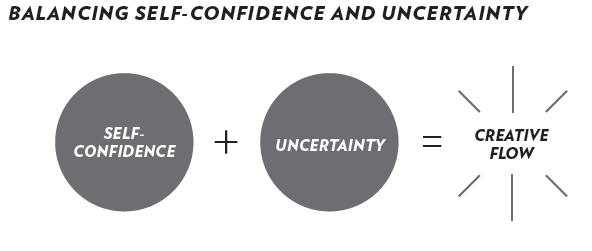
In my coaching practice, leaders often ask me how assertive they should be. “Do I just tell people what I think,” is a typical comment. “What if I’m not certain about our direction?” Or, to give another example, “How certain do I need to be before making a decision that affects a lot of people?”
While the two traits may seem similar, in actuality, they are not.
 Here’s what the study showed: Leaders were given a survey and asked to rate how many of their decisions each day were absolutely correct. They were also asked to evaluate their level of confidence. Employees were then asked to assess these same qualities in their leaders.
Here’s what the study showed: Leaders were given a survey and asked to rate how many of their decisions each day were absolutely correct. They were also asked to evaluate their level of confidence. Employees were then asked to assess these same qualities in their leaders.
Here’s what the research revealed: Leaders who were confident but relatively uncertain were viewed as more effective, more likely to foster creative thinking and independent thinking. Those who were confident and certain were viewed as authoritarian and inflexible.
When you think about it, this conclusion isn’t too surprising. When people work for leaders who are confident but uncertain, they feel more relaxed, more expressive, and more innovative. When you work for a boss who is confident and certain, you’re left feeling that your own contributions aren’t as important. You tend to feel second-guessed. Before you know it, most of your energy is devoted to managing your boss’s reactions rather than finding better ways of doing things.
 To break this cycle, leaders need to openly admit their uncertainty – to confess that they don’t always know the answers, to state openly that they look to others to find solutions. Great leaders go one step further. They continually poke at their own assumptions and expose their “facts” as probabilities – not certainties. They encourage people to express their own viewpoints. They show an appreciation for the fact that the best decisions emerge from the give and take between active minds.
To break this cycle, leaders need to openly admit their uncertainty – to confess that they don’t always know the answers, to state openly that they look to others to find solutions. Great leaders go one step further. They continually poke at their own assumptions and expose their “facts” as probabilities – not certainties. They encourage people to express their own viewpoints. They show an appreciation for the fact that the best decisions emerge from the give and take between active minds.
Ultimately, leadership is about projecting confidence in the success of the company. But balancing that confidence with an “open mind” policy is one of the keys. Projecting too much certainty is a trap you want to avoid.
Leading Resources, Inc. is a Sacramento Leadership Coaching firm that develops leaders and leading organizations. Subscribe to our leadership development newsletter to download the PDF – “The 6 Trust-Building Habits of Leaders” to learn more about how to build trust with your team.